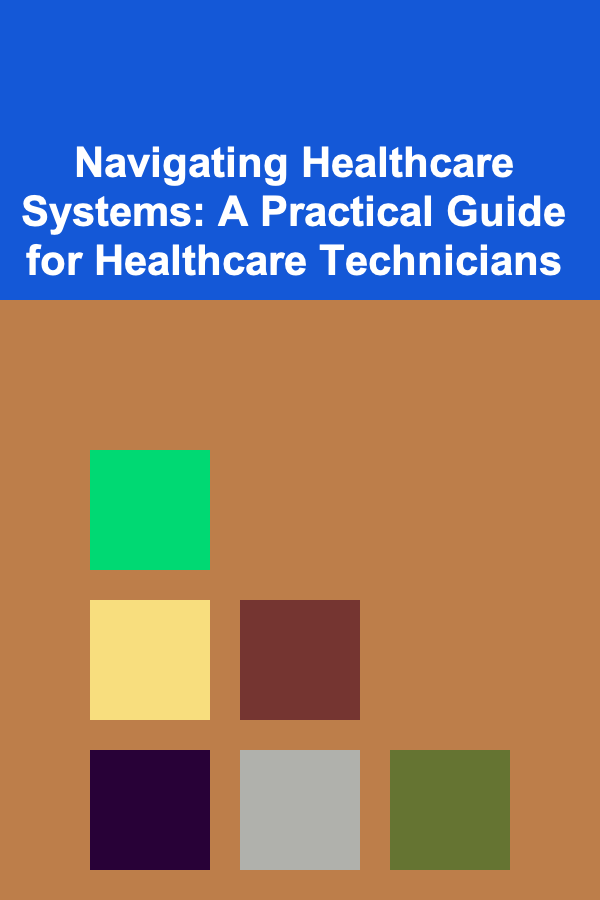
Navigating Healthcare Systems: A Practical Guide for Healthcare Technicians
ebook include PDF & Audio bundle (Micro Guide)
$12.99$9.99
Limited Time Offer! Order within the next:

The healthcare industry is vast, complex, and continuously evolving. Healthcare technicians, playing a critical role in the delivery of care, face the challenge of adapting to these changes while managing various administrative and clinical responsibilities. Understanding the intricate systems, processes, and tools in place within healthcare settings is key to being effective in their roles. This actionable guide aims to provide healthcare technicians with a comprehensive understanding of healthcare systems, from clinical workflows to communication and technology use.
The Role of Healthcare Technicians in the Larger Healthcare System
Healthcare technicians are responsible for maintaining the systems, equipment, and processes that healthcare professionals rely on to deliver quality patient care. Their duties vary by specialization but generally include tasks like setting up and maintaining medical equipment, providing technical support to healthcare professionals, ensuring safety protocols, and managing patient information.
While technicians may not directly interact with patients in the same way nurses or doctors do, their role is integral to the overall functionality of the healthcare system. Understanding how their work intersects with other components of the healthcare infrastructure helps them become more efficient, proactive, and adaptable.
Key Components of Healthcare Systems
1. Clinical Workflows and Patient Care
Clinical workflows are the backbone of healthcare delivery. These workflows involve a series of steps taken by healthcare providers, technicians, and administrators to ensure that a patient's care is effective, efficient, and organized. As a healthcare technician, understanding these workflows is crucial because it enables you to contribute meaningfully at various points in the process.
Some of the key elements of clinical workflows that technicians often interact with include:
- Patient intake: Technicians may assist with the initial intake of patient data, including vital signs, medical histories, and other relevant information. This data is essential for making informed decisions about patient care.
- Diagnostic procedures: Healthcare technicians, such as radiologic or laboratory technicians, play a key role in conducting diagnostic tests, from blood draws to imaging procedures. Ensuring that these tests are performed accurately and efficiently is vital to patient care.
- Treatment and monitoring: Technicians ensure that the equipment used in patient monitoring and treatment is functioning properly. This includes equipment like ventilators, infusion pumps, and patient monitoring devices.
- Discharge and follow-up: After treatment, healthcare technicians may assist with discharge procedures, ensuring that patients leave with the proper equipment or instructions for follow-up care.
2. Healthcare IT Systems and Electronic Health Records (EHR)
Technology has become an indispensable part of modern healthcare. Healthcare technicians must be familiar with various healthcare IT systems, particularly Electronic Health Records (EHR), as they play a central role in the efficient delivery of patient care.
- Understanding EHRs: Electronic Health Records store critical patient information, including medical history, lab results, medications, allergies, and treatment plans. EHR systems streamline data sharing between medical professionals, reducing errors and improving overall care. Healthcare technicians must ensure that the equipment used to input, update, and retrieve data is functioning properly.
- Data privacy and security: With healthcare data being digitized, protecting patient privacy and ensuring that sensitive information is stored and transferred securely is a priority. Healthcare technicians should have a solid understanding of data security practices and HIPAA compliance regulations.
- Interoperability: In many healthcare systems, different departments or facilities may use different EHR platforms. Understanding how these systems can share data through standardized protocols ensures that patient information flows seamlessly between departments or even across organizations.
3. Healthcare Regulations and Compliance
Healthcare technicians must be familiar with a variety of regulations that govern the industry. These regulations ensure that patient care is delivered safely and ethically. Key areas of compliance include:
- HIPAA (Health Insurance Portability and Accountability Act): HIPAA regulates how patient information is handled, ensuring it remains confidential and is protected from unauthorized access. Technicians must be vigilant about maintaining data privacy and security, especially when handling personal health information (PHI).
- FDA regulations: The Food and Drug Administration (FDA) oversees the safety of medical devices and equipment. Healthcare technicians must ensure that all devices are in compliance with FDA standards and that they are regularly calibrated and maintained.
- OSHA (Occupational Safety and Health Administration): OSHA standards govern workplace safety, including exposure to hazardous materials and infection control. Technicians must be aware of and adhere to safety protocols in healthcare settings to protect both patients and staff.
- State and local regulations: In addition to federal regulations, healthcare technicians must also be aware of state and local rules that may govern specific aspects of healthcare practice, such as licensure requirements, reporting standards, and scope of practice.
Practical Steps for Healthcare Technicians
1. Develop Technical Skills
Healthcare systems depend heavily on a range of specialized equipment and technologies, from diagnostic machines to patient monitoring systems. To excel in the field, technicians must continuously develop their technical skills in areas such as:
- Medical equipment maintenance and calibration: Healthcare technicians are often responsible for ensuring that medical equipment is functioning properly. Regular maintenance and calibration are crucial for providing accurate readings and preventing malfunctions.
- Troubleshooting: When equipment fails or malfunctions, technicians must quickly identify the issue and make repairs. A strong knowledge of diagnostic procedures, equipment manuals, and troubleshooting techniques is essential for minimizing downtime and ensuring patient safety.
- Software proficiency: Many healthcare systems utilize specialized software for managing patient information, imaging data, or lab results. Technicians must be proficient in the software used in their specific area of work to ensure efficient operation and data management.
2. Enhance Communication Skills
While healthcare technicians often work behind the scenes, effective communication is essential for smooth operations. Technicians must collaborate with a variety of healthcare professionals, including doctors, nurses, and administrators. Key communication practices include:
- Clear documentation: Technicians must document their work clearly and thoroughly, whether it involves equipment maintenance logs, patient data, or test results. This ensures that other healthcare providers can rely on the information they provide.
- Collaboration and teamwork: Healthcare delivery is a team effort. Technicians should be proactive in communicating with colleagues to ensure that workflows are coordinated and that patient care is seamless. Being responsive and approachable fosters a collaborative work environment.
- Patient communication: While technicians may not interact directly with patients in many cases, there are times when they will need to explain procedures, answer questions, or provide reassurance. Communicating with empathy and clarity is essential for building trust and reducing patient anxiety.
3. Focus on Continuous Education
Healthcare technology and best practices are constantly evolving. Healthcare technicians should pursue continuous education and professional development to stay ahead of industry trends and improve their skill set. Practical steps to continue learning include:
- Certifications: Many healthcare technician roles offer certifications that demonstrate expertise in specific areas, such as medical imaging, lab technology, or medical equipment maintenance. These certifications can enhance job prospects and improve technical proficiency.
- Conferences and workshops: Attending industry conferences and workshops allows technicians to stay up-to-date on new technologies, equipment, and practices. Networking with peers and learning from experts in the field can also provide valuable insights into improving job performance.
- Online courses and training: Many organizations offer online courses that focus on new healthcare technologies or regulatory changes. Healthcare technicians should take advantage of these resources to stay informed and enhance their knowledge.
4. Prioritize Patient Safety and Quality Care
As a healthcare technician, patient safety is paramount. Technicians contribute to safety by ensuring that equipment is functioning properly, that protocols are followed, and that the correct information is available to the healthcare team. Key considerations for patient safety include:
- Adhering to protocols: Strict adherence to established safety protocols minimizes the risk of errors and accidents. This includes following infection control measures, ensuring the proper sterilization of equipment, and following manufacturer instructions for equipment use.
- Regular equipment checks: Equipment failure can have serious consequences for patient safety. Healthcare technicians must regularly inspect and test equipment to ensure it is in optimal working condition.
- Reporting hazards and incidents: Technicians are in a prime position to spot potential safety hazards. Whether it's faulty equipment, safety violations, or irregularities in clinical processes, technicians should report issues promptly to prevent harm to patients.
Conclusion
Navigating healthcare systems as a healthcare technician requires a blend of technical expertise, effective communication, and a deep understanding of the regulatory landscape. By continuously honing their skills, staying informed about the latest technologies, and prioritizing patient safety, technicians can significantly contribute to the healthcare system's overall effectiveness and efficiency.
As the healthcare industry continues to evolve, technicians must remain adaptable and committed to lifelong learning. Their role is vital in ensuring that healthcare systems operate smoothly, ultimately leading to improved outcomes for patients and a more efficient healthcare environment.

How to Build a Writing Portfolio to Attract Clients
Read More
How to Encourage Self-Discipline in a Remote Learning Environment
Read More
How to Use a Binder to Organize Craft Patterns
Read More
How to Use Deep Learning to Create Profitable AI Products
Read More
How to Use Social Media for Real Estate Marketing
Read More
How to Use Trays and Bowls for Casual Jewelry Organization
Read MoreOther Products

How to Build a Writing Portfolio to Attract Clients
Read More
How to Encourage Self-Discipline in a Remote Learning Environment
Read More
How to Use a Binder to Organize Craft Patterns
Read More
How to Use Deep Learning to Create Profitable AI Products
Read More
How to Use Social Media for Real Estate Marketing
Read More